PSHE & RSE - Key Stage 5

 Creating a safe space for RSE lessons
Creating a safe space for RSE lessons
Ensuring your Relationships and Sex Education (RSE) lessons are inclusive and safe is often easier said than done. The primary goal of creating a safe space for RSE lessons is to create an environment where young people feel safe to share and are respectful of one another’s feeling.
The Group Agreement
An important element in creating a safe learning environment is setting a group agreement for the lesson. This is like a set of ground rules which helps to set clear boundaries so that everyone feels able to safely:
• Share feelings
• Express views
• Explore values
Managing Questions
At both primary and secondary level, young people have a right to ask questions. However, this doesn’t mean they always need to be answered (or answered immediately). Teachers need to feel prepared to hold boundaries and empowered to shut down inappropriate questioning or comments.
Maintaing Distance
Distancing techniques should be employed throughout RSE lessons. This means not making young people share their personal experiences with others, which may potentially be traumatic or challenging. Instead, you can use characters, case studies, fictional scenarios or videos to explore a topic.
A judgement free environment
If a young person chooses to ask a question during the lesson, remember that this is often a sign that they trust you and your ability to give them an open and honest answer. Try to create a non-judgemental environment, where ideas and contributions are encouraged and are not ridiculed or mocked. If unhealthy ideas are communicated these should be challenged positively where possible and followed up after the lesson. Be aware of the language you use to avoid shame and stigma.
Keeping it relevant
Make lessons relevant to young peoples’ lived experience where possible, especially when considering the online world and how this relates to the topic. This is where continuously seeking feedback will come in useful; it will help you better understand the concerns that young people have or spot trends in the questions they are asking. It’s also worth keeping an eye on things going on in the world that might impact young people. For example, news stories or recent events that you know young people will take an interest in or may affect their lives in some way.
 Key Wellbeing, PSHE & Cultural Dates Calendar 2024/25
Key Wellbeing, PSHE & Cultural Dates Calendar 2024/25
This PDF document from youHQ includes;
- An overview of the Academic Year
- A list of important dates
- A detailed planner with pages
- Free monthly resources
Guidance
 DfE guidance on sex and relationship education in schools has been written to take account of the revised National Curriculum, published in September 1999, the need for guidance arising out of the new Personal, Social and Health Education (PSHE) framework and the Social Exclusion Unit report on teenage pregnancy.
DfE guidance on sex and relationship education in schools has been written to take account of the revised National Curriculum, published in September 1999, the need for guidance arising out of the new Personal, Social and Health Education (PSHE) framework and the Social Exclusion Unit report on teenage pregnancy.
Sex and Relationship Education Guidance - Department for Education good practice
Effective learning methods - Approaches to teaching about sex and relationships within PSHE and Citizenship
- Your Brain on Porn is a secular site, although everyone's views are welcome. It is primarily science-based, and no one involved in the creation of the site is trying to ban porn. It is not a commercial site: no ads are accepted, and the proceeds from the book go to a UK registered charity that promotes education and research on porn's effects. The site was created because the founders dislike needless human suffering simply because individuals lack critical information for improving their circumstances themselves.

Your Brain on Porn
Addressing Pornography through PSHE Education This briefing draws together key research into effective education about pornography within a wider relationships and sex education curriculum. It is intended for PSHE leads and teachers who are beginning to teach about pornography and its potential harms to young people, or who are reviewing
their existing PSHE education curriculum content.
What is the impact of pornography on young people? This briefing summarises some of the key research on the impact of pornography to support teachers and others in delivering this element of the curriculum.
Children's Commissioner - Growing up and pornography
Pornography and Human Futures
Resources
 Fertility and Pregnancy Choices - The PSHE Association fertility and pregnancy choices lessons address how fertility changes over a person’s lifetime and the factors that may affect male and female fertility, pelvic health (NEW!) and healthy pregnancy, as well as the different routes someone might take to becoming a parent.
Fertility and Pregnancy Choices - The PSHE Association fertility and pregnancy choices lessons address how fertility changes over a person’s lifetime and the factors that may affect male and female fertility, pelvic health (NEW!) and healthy pregnancy, as well as the different routes someone might take to becoming a parent.
Rise Above - A great site for teens packed with games, advice, stories, and videos to prepare them for real life issues such as relationships, exams, body image and more.
Preventing sexism & sexual harassment - National Education Union have development a toolkit that helps members take the steps needed to prevent sexism and sexual harrassment in schools.
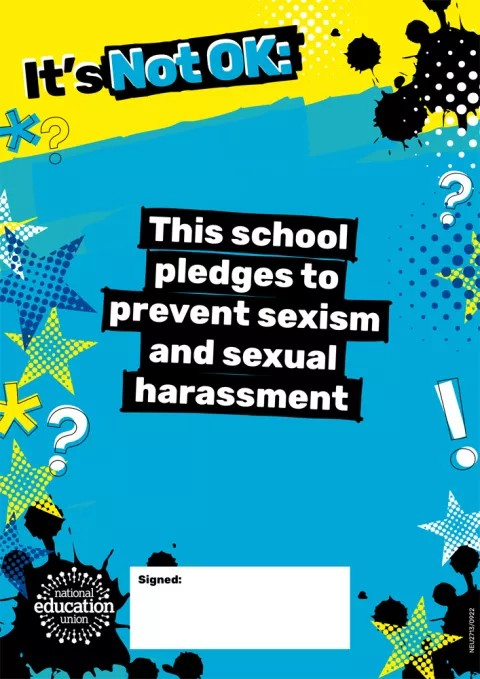
Poster Resources:
 Loudmouth - Theatre-in-Education workshop and PSHE/RSE resource provider.
Loudmouth - Theatre-in-Education workshop and PSHE/RSE resource provider.

Programme of Study for PSHE Education (Key stages 1–5) - Produced by the PSHE Association.

What is sexual harassment?: Sexual harassment in the workplace films - Suitable for PSHE lessons with 14-16 year olds. The films are a specifically written drama in three parts which tell the story of a professional relationship between a man and woman at work, involving an accusation of sexual harassment and an employment tribunal hearing. Each film is accompanied by a separate discussion piece which is hosted by journalist and presenter Ben Zand. 20 young people examine how they understand the rules of behaviour in the workplace.
Visit the BBC Teach website
 Teen Relationships Film: I'm Just Me - “I’m just me... It's like coming up for air."
Teen Relationships Film: I'm Just Me - “I’m just me... It's like coming up for air."
As Jaz and Charlie make a final attempt to keep their relationship alive, one of them co mes out as non-binary (meaning they don’t identify as male or female), sparking a conversation that will change them both forever.
 CoppaFeel! Digital Resources - Lesson plans, videos, and everything in between to get yourself and your pupils clued up on boobs.
CoppaFeel! Digital Resources - Lesson plans, videos, and everything in between to get yourself and your pupils clued up on boobs.
 Online Blackmail resource - Produced by NCA-CEOP and awarded the Quality Mark by the PSHE Association. The resource is designed to help young people gain the knowledge, skills and confidence to identify risk and seek help with our Online blackmail education resource. You’ll find a session plan, worksheets and slides designed to be used across a range of settings.
Online Blackmail resource - Produced by NCA-CEOP and awarded the Quality Mark by the PSHE Association. The resource is designed to help young people gain the knowledge, skills and confidence to identify risk and seek help with our Online blackmail education resource. You’ll find a session plan, worksheets and slides designed to be used across a range of settings.
‘Online blackmail’ is free-to-access and aims to support young people to recognise key characteristics of how blackmail manifests online, including early signs of manipulative, pressurising and threatening behaviour. It also explores the potential impact of online blackmail and provides sources of further support for those who experience it.
The pack includes a lesson plan, worksheets and slides to support delivery. Note that ‘Online blackmail’ is not designed for home learning, but will support eductors when planning RSE aspects of their PSHE education curriculum.
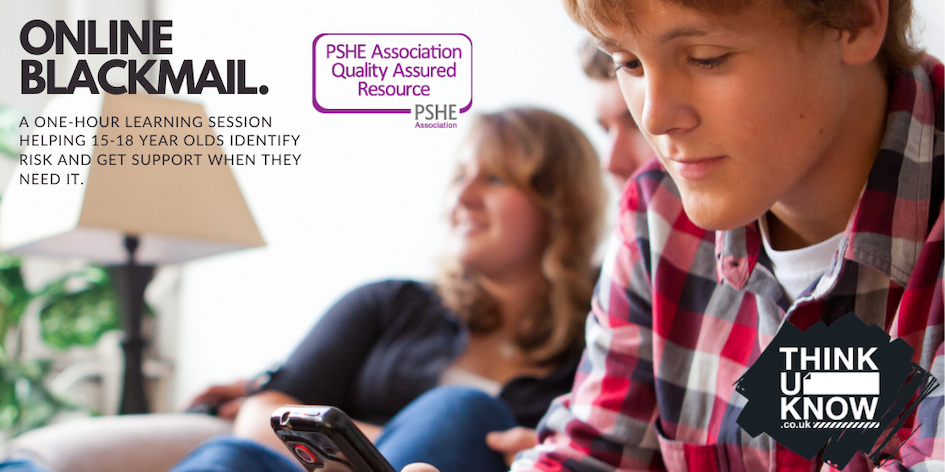
The one-hour Online blackmail session can be delivered in schools, colleges, youth groups and other educational settings.
Online Blackmail- Session Slides
Online Blackmail Resource Pack
If you are interested in learning more about the evidence base for this and similar approaches, we recommend you read the research report ‘Key Principles of Effective Preventative Education’,
downloadable from www.thinkuknow.co.uk/professionals.
Articles/Videos
 "We must listen to science, not stigma"
"We must listen to science, not stigma"
Around 1 in 3 Brits would be 'uncomfortable' giving First Aid to someone with HIV on effective treatment, according to Terrence Higgins Trust survey, while nearly 40% would be 'uncomfortable' going on a date. Terrence Higgins Trust's Can't Pass it On campaign aims to help end stigma around HIV, and end HIV transmissions altogether.
Find out more about the Can't Pass it On campaign here.
Want to know why young people are sexting? Try asking them
 Jeremy Hunt, parents and teachers fail to understand how teenagers use technology to experiment sexually. Proposing a sexting ban is just puritanical.
Jeremy Hunt, parents and teachers fail to understand how teenagers use technology to experiment sexually. Proposing a sexting ban is just puritanical.
Read the full article here
Roadmap to Statutory RSE
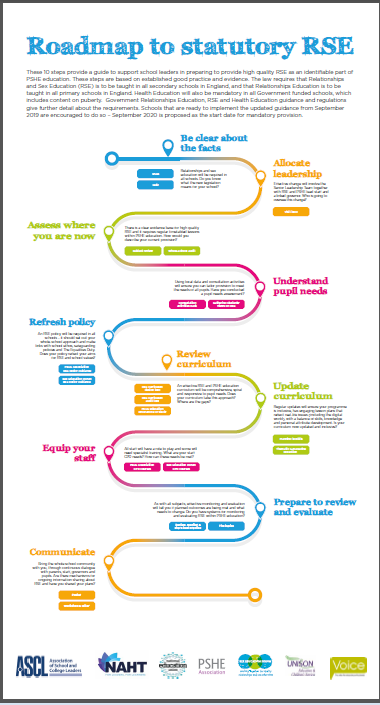
Relationships and sex education will be required in all schools. September 2020 is proposed as the start date for mandatory provision. Do you know what the new legislation means for your school?
To help school leaders prepare, the poster provides a 10 steps guide to provide high quality RSE as an identifiable part of PSHE education. These steps are based on established good practice and evidence.
Click on the link below to view a full size version of the poster.
View the Roadmap to Statutory RSE here
When sex goes wrong
What happens when sex goes wrong? In this new series of bold animations, Brook looks at real life stories of sexual encounters that didn't go quite as planned. The films use humour to reassure people that sex is rarely 'perfect' and that good sex should be about consent, pleasure and communciation, rather than unrealistic expectations.
View videos here.
Schoolbeat
GHLL has worked with the Gloucestershire Police Schoolbeat team, producing and assisting in the development of their initial curriculum.
The Schoolbeat team consists of seven police officers who are designated to certain areas across Gloucestershire, covering the majority of both primary and secondary schools.
The main responsibilities of the role are to build trusting relationships with students from Year 6 through to Year 9.
This is completed by:
-
Delivering bespoke inputs to each educational establishment, based on the RSE curriculum and force operational priorities, to Year 6 through to Year 9 students
-
Participating in and, where relevant, facilitating restorative interventions involving students from their allocated schools
-
Facilitating early intervention through timely and effective information sharing between police and schools
-
Co-ordinating the delivery of educative inputs by local policing teams - PCSOs within local schools
-
Cascading learning and upskilling local PCSOs in relation to school engagement
-
Empowering students to make positive decisions, to reduce the risk of them becoming victims or offenders of crime and/or anti-social behaviour
-
Supporting schools with safeguarding, reducing student exclusions and to provide advice on day to day police related issues
Find out more here
The Schoolbeat team can be contacted via email: Schoolbeat@gloucestershire.pnn.police.uk
If you would like further information, or wish to make a booking please e-mail your local Schoolbeat officer directly:
The Secondary RSE Audit
In September 2020, it became compulsory for schools to deliver statutory Relationships and Sex Education (RSE) and Health Education. To support this process GHLL have designed a simplified version of the curriculum requirements (beginning with RSE).
-
What are you doing well?
-
What do you do that could/should be developed further?
-
Do you require support to enable these developments?
View the document here
Siobhan Baille concerned about sexual harrassment of schoolgirls in Stroud

MP Siobhan Baillie has met with pupils from Stroud High School for Girls to discuss a survey they undertook looking at sexism and violence against women and to discuss their experiences of sexual harassment.
Siobhan met with the pupils from years 8 to 11 and was presented with the results of a survey they undertook among 80 Year 9 students.
Read full article here
Watch the parliamentary discussion here
Consent for Students (High Education)
Brook have a online course to help students identify what consent means and summarise the laws around sexual consent. It will help foster a positive culture of consent on your campus and lead to healthier sexual relationships in your community. 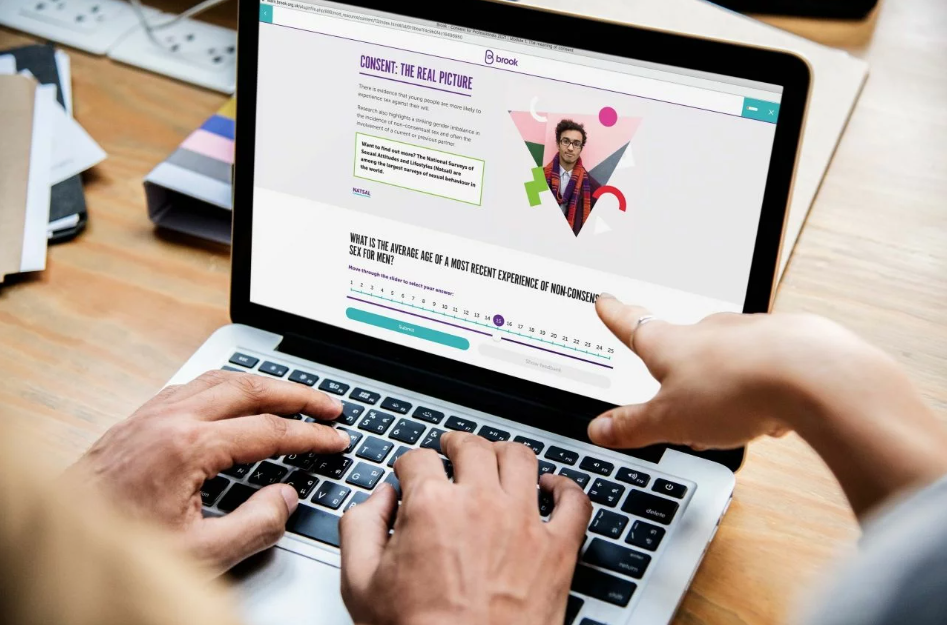
By the end of this course, students will be able to:
- Identify what consent means
- Explain what counts as sex or sexual activity
- Describe some of the factors involved in giving and getting consent
- Summarise the laws relating to sexual consent
- Identify myths about sex, sexual violence, rape and consent
- Understand scenarios where consent has been sought and given and where it has not
- Describe the range of thoughts and feelings that someone might have when considering having sex
- Identify verbal and non-verbal methods of communication and consent
Click here to find out more and access the course
Easy read definition of sexual health 
The sex education forum have produced a easy read definition of sexual health. Suitable for Secondary and Further Education including Special.
Click here to access the resource
Teaching relationships education to prevent sexual abuse- Research Report September 2024
Published in September 2024 this new research project builds on the findings of Ofsted’s 2021 Review of sexual abuse in schools and colleges. The Ofsted review commented on how prevalent sexual harassment and online sexual abuse have become for children and young people: “It is concerning that for some children, incidents are so commonplace that they see no point in reporting them.” The report went on to recommend the need for:
“[A] carefully sequenced RSHE curriculum, based on the Department for Education’s (DfE’s) statutory guidance, that specifically includes sexual harassment and sexual violence, including online. This should include time for open discussion of topics that children and young people tell us they find particularly difficult, such as consent and the sending of ‘nudes.’” – Ofsted
Following the publication of revised statutory guidance for relationships, sex and health education, the DfE is looking to provide further support for schools in teaching about sexual harassment, sexual violence, and violence against women and girls. The primary aim of this project was to conduct a review of evidence to inform further support for schools and to ensure that this support is based on the best possible evidence, particularly of best practice. The evidence review was conducted employing the technique of a Rapid Evidence Assessment (REA). The methodology and steps to conducting an REA are presented in the section below. As a secondary aim, this project also identified evidence gaps and areas requiring further research. Finally, another key aim of the project was the development of a list of key recommendations for further support for schools. The recommendations are based on (i) the literature reviewed, and (ii) advice, expertise and additional evidence shared by a group of sector experts formed specifically for this project (which is described as the ‘Expert Group’ in the rest of this report).
This report presents the results of the REA, providing a comprehensive review of evidence on teaching interventions to prevent sexual abuse, and the list of recommendations produced based on the findings of the REA and inputs from the Expert Group.
Click here to access the full report
Brook Period Resources
Brook have lots of useful resources around Periods including this video on "Top Tips for Period Wellbeing".
They also have full pre-recorded lessons such as "The big period lesson 2"
There are also some user friendly handouts on a variety of PSHE & RSE themes=:
Consent Handout
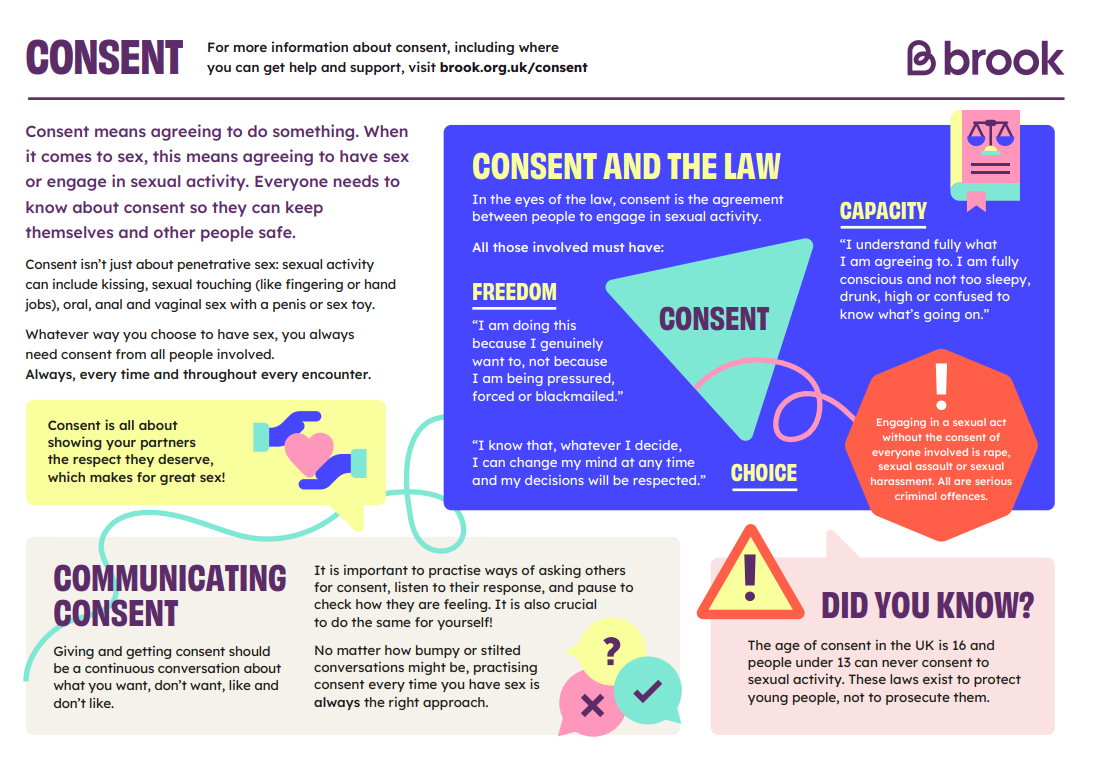
Sexually Transmitted Infections (STI's) Handout
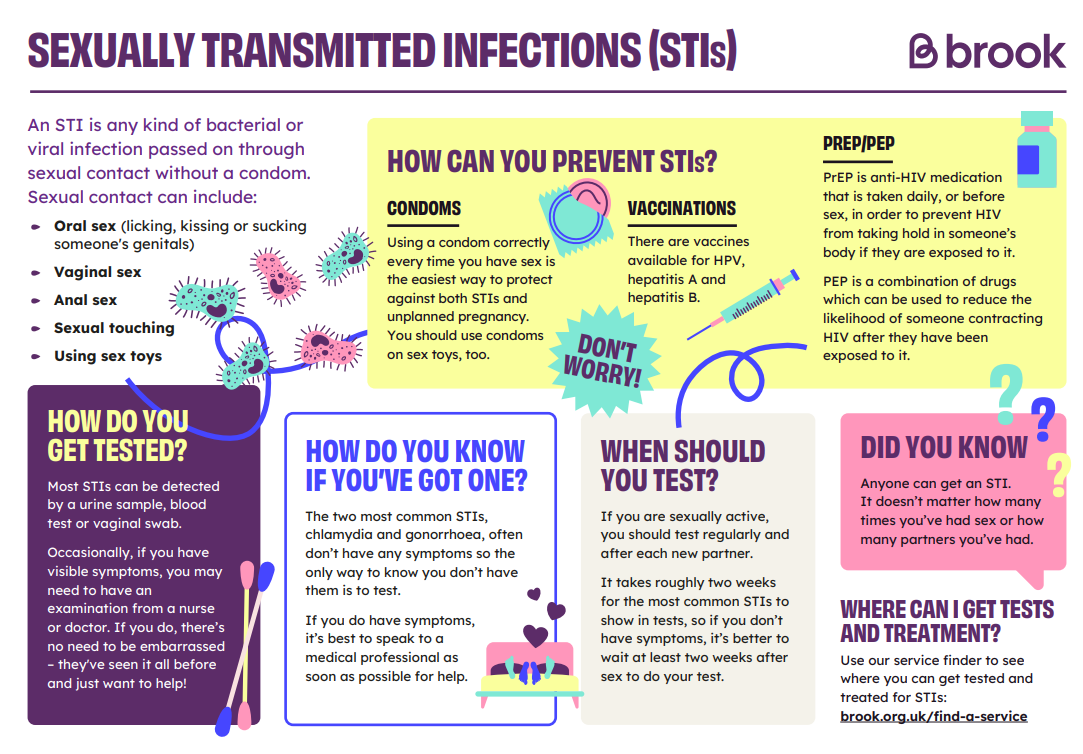
Period Handout
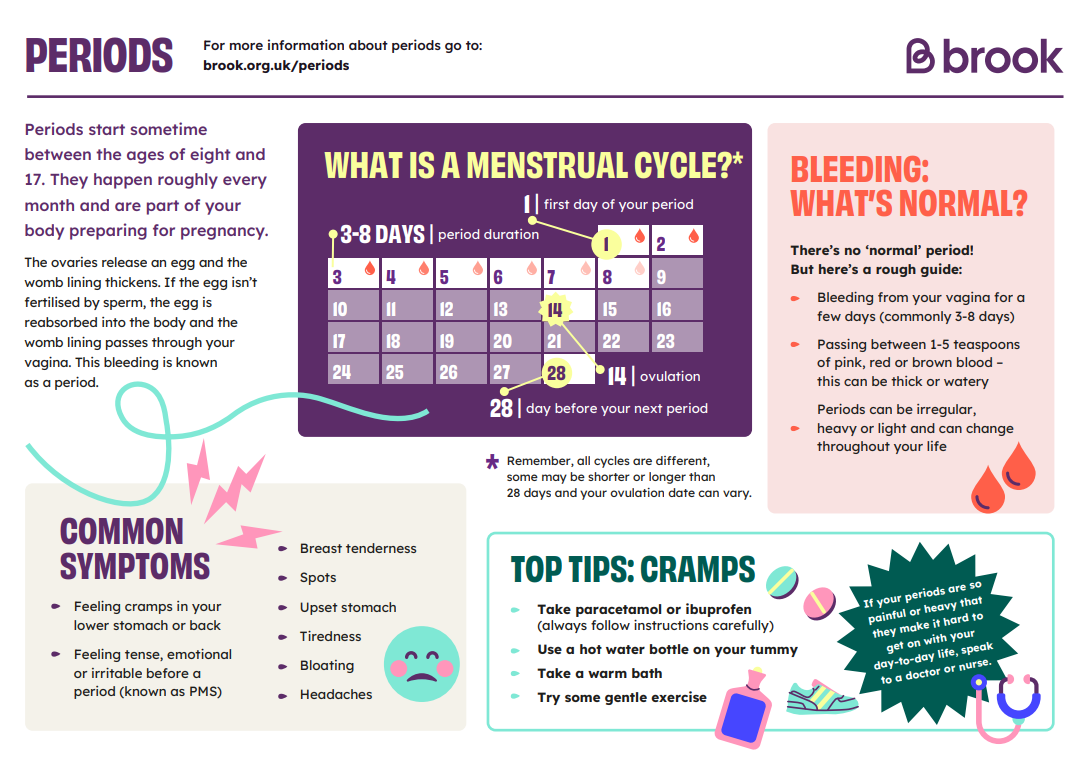
Porn Handout
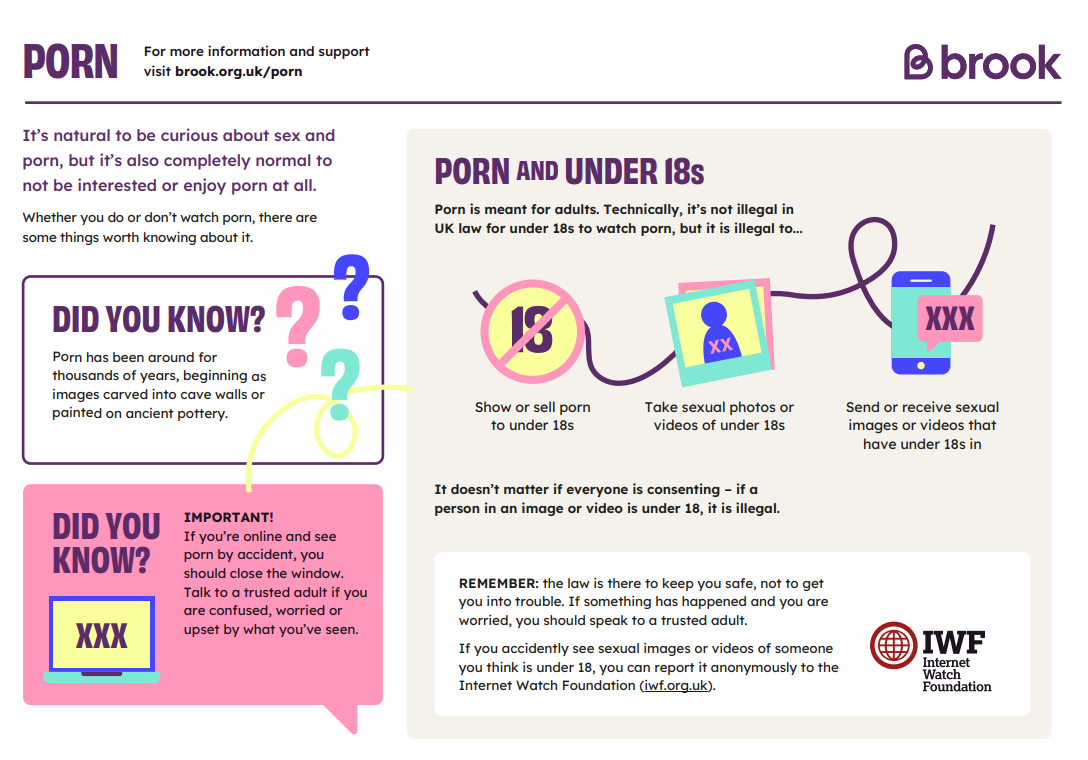
Useful Guidance for Schools from "School of Sexuality Education"
Useful information and resources for parents, carers, school leaders and young people on a variety of subjects including Online Sexual Harassment, Incel Movement, Sexual Violence Prevention, Image-based sexual harassment and abuse, School uniform guidance and a RSHE Policy Guide. Click here to view the resources
Trauma Informed Schools Wales 10 Quick Steps to "Transforming Behaviour, Improving Well-Being & Mental Health in Schools"
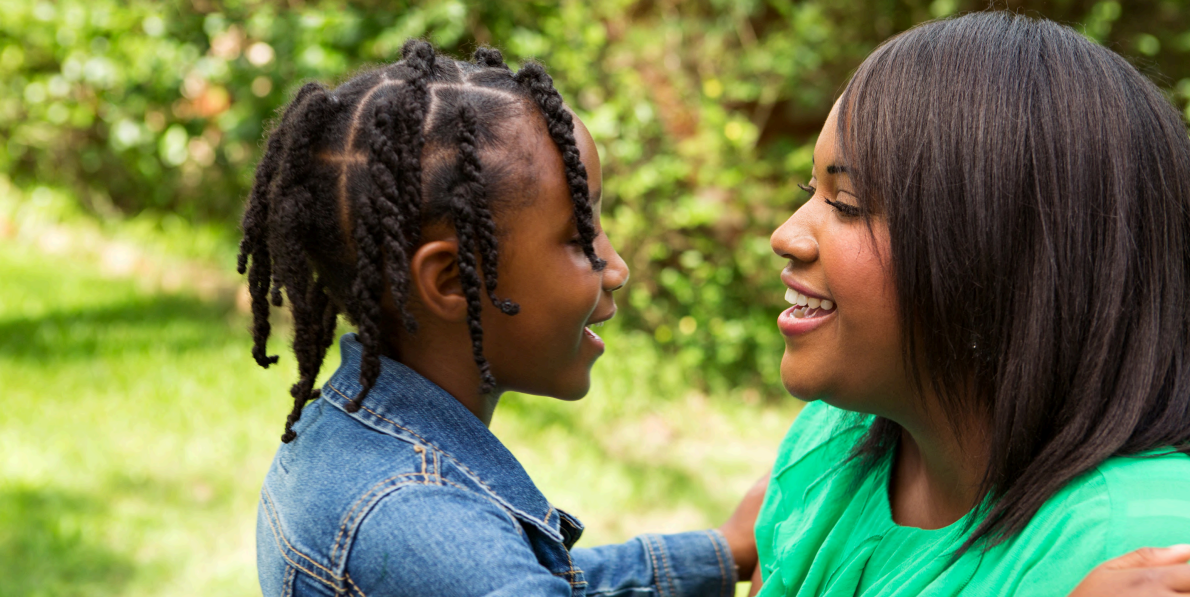 Check out these 10 quick steps to empower schools and communities to support children and young people to talk about their feelings, experiences and painful life events with an emotionally available adult, with tips on how to take care of yourself in order to provide this for the young people you work with.
Check out these 10 quick steps to empower schools and communities to support children and young people to talk about their feelings, experiences and painful life events with an emotionally available adult, with tips on how to take care of yourself in order to provide this for the young people you work with.
10 Quick Tips Factsheet from Trauma Informed Schools Wales and UK


 Key Wellbeing, PSHE & Cultural Dates Calendar 2024/25
Key Wellbeing, PSHE & Cultural Dates Calendar 2024/25 DfE guidance on sex and relationship education in schools has been written to take account of the revised National Curriculum, published in September 1999, the need for guidance arising out of the new Personal, Social and Health Education (PSHE) framework and the Social Exclusion Unit report on teenage pregnancy.
DfE guidance on sex and relationship education in schools has been written to take account of the revised National Curriculum, published in September 1999, the need for guidance arising out of the new Personal, Social and Health Education (PSHE) framework and the Social Exclusion Unit report on teenage pregnancy.



 Jeremy Hunt, parents and teachers fail to understand how teenagers use technology to experiment sexually. Proposing a sexting ban is just puritanical.
Jeremy Hunt, parents and teachers fail to understand how teenagers use technology to experiment sexually. Proposing a sexting ban is just puritanical.














 Check out these 10 quick steps to empower schools and communities to support children and young people to talk about their feelings, experiences and painful life events with an emotionally available adult, with tips on how to take care of yourself in order to provide this for the young people you work with.
Check out these 10 quick steps to empower schools and communities to support children and young people to talk about their feelings, experiences and painful life events with an emotionally available adult, with tips on how to take care of yourself in order to provide this for the young people you work with.

